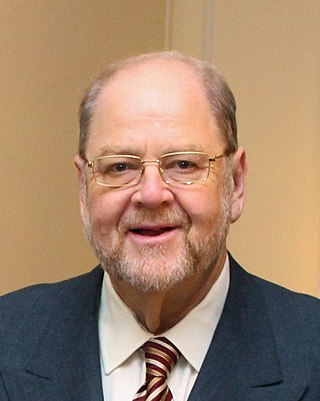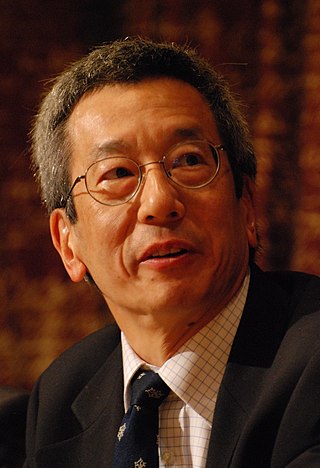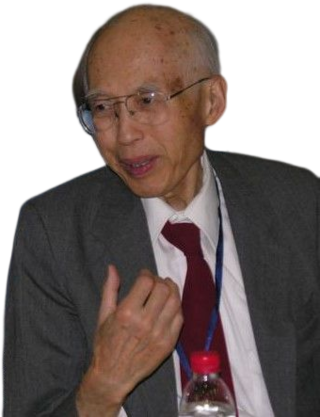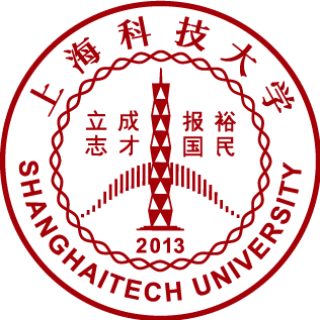Related Research Articles

The Chinese Academy of Sciences is the national academy for natural sciences and the highest consultancy for science and technology of the People's Republic of China. It is the world's largest research organization, with 106 research institutes, 2 universities, 71,300 full-time employees, and 79 thousand graduate students.

The Rockefeller University is a private biomedical research and graduate-only university in New York City, New York. It focuses primarily on the biological and medical sciences and provides doctoral and postdoctoral education. It is classified as a "Special Focus – Research Institution". Rockefeller is the oldest biomedical research institute in the United States.

James Edward Rothman is an American biochemist. He is the Fergus F. Wallace Professor of Biomedical Sciences at Yale University, the Chairman of the Department of Cell Biology at Yale School of Medicine, and the Director of the Nanobiology Institute at the Yale West Campus. Rothman also concurrently serves as adjunct professor of physiology and cellular biophysics at Columbia University and a research professor at the UCL Queen Square Institute of Neurology, University College London.

The University of the Chinese Academy of Sciences is a public university headquartered in Shijingshan, Beijing, China. It is affiliated with the Chinese Academy of Sciences. The university is part of the Double First-Class Construction. Officially established in 2012, the university derives from the Graduate School of the University of Science and Technology of China founded in 1978.
The College of Biological Sciences (CBS) is one of seven freshman-admitting colleges at the University of Minnesota. Established in 1965, the College of Biological Sciences is located on both the Minneapolis and the St. Paul campuses. Faculty in the college conduct research on a wide range of topics that contribute to understanding of the environment, human health and basic biology. Dr. Saara J. DeWalt is the current dean of the college.
Xiaodong Wang is a Chinese-American biochemist best known for his work with apoptosis, one of the ways through which cells kill themselves.

Roger Yonchien Tsien was an American biochemist. He was a professor of chemistry and biochemistry at the University of California, San Diego and was awarded the Nobel Prize in Chemistry in 2008 for his discovery and development of the green fluorescent protein, in collaboration with organic chemist Osamu Shimomura and neurobiologist Martin Chalfie. Tsien was also a pioneer of calcium imaging.

Jan-Åke Gustafsson is a Swedish scientist and professor in Biology, Biochemistry and Medical Nutrition. When he decided to move to Houston, Texas, USA, in 2008, the State of Texas decided to give a major US $5.5 million research grant to the University of Houston, enabling the establishment of the Center of Nuclear Receptors and Cell Signaling under the leadership of Jan-Åke Gustafsson. The grant was announced at a February 5, 2009, press conference by Rick Perry, Governor of Texas and running for the Republican nomination for President of the United States in the 2012 presidential election.
Yao Zhen was a Chinese biologist and oncologist. He served the first president of Asian-Pacific Organization for Cell Biology.

Shu Chien is a Chinese-born Taiwanese-American physiologist and bioengineer. His work on the fluid dynamics of blood flow has had a major impact on the diagnosis and treatment of cardiovascular diseases such as atherosclerosis. Chien is currently President of the Biomedical Engineering Society.

Ray Jui Wu was a Chinese-born American geneticist and served as Liberty Hyde Bailey Professor of Molecular Genetics and Biology at Cornell University.

Feng Depei or Te-Pei Feng was a Chinese neuroscientist and physiologist. He is considered one of founders of modern Chinese neuroscience and physiology.
Madhu Sudan Kanungo was an Indian scientist in the field of gerontology and neuroscience as well as a teacher of molecular biology and biochemistry. He is known for his theories on how gene expression changes with age and the role of this phenomenon in ageing, which is a widely accepted as "Gene expression theory of Aging". In recognition of his contributions, he was awarded India's fourth highest civilian award, Padma Shri in 2005. He held the post of BHU Emeritus professor in zoology at the Banaras Hindu University and was also the Chancellor, Nagaland University till his death.

ShanghaiTech University is a municipal public science and engineering university in Pudong, Shanghai, China. The university was founded in 2013 by contracts between the Shanghai Municipal People's Government and the Chinese Academy of Sciences. The university is part of the Double First-Class Construction.
Rao Yi is a Chinese neurobiologist. A Ph.D. graduate from the University of California, San Francisco, Rao held a Helen Hay Whitney fellowship at Harvard University and was on the faculty of Washington University in St. Louis and Northwestern University before moving back to China to take up the deanship of Peking University's School of Life Sciences in 2007. He is currently Director and Principal Investigator of IDG/McGovern Institute for Brain Research at Peking University.

Cao Tianqin, also known as Tien-chin Tsao, was a Chinese biochemist and a professor at the Shanghai Institute of Biochemistry. With a research focus on muscle protein, he discovered the myosin light chain and pioneered the study of tropomyosin and paramyosin using electron microscopes. He was a strong advocate and main leader for the synthesis of insulin, and spearheaded the research of plant viruses in China.

Zhang Youshang was a Chinese biochemist, professor and vice-president of the Shanghai Institute of Biochemistry and Cell Biology. He was a member of the Chinese Academy of Sciences and served as chief editor of the peer-reviewed journal Acta Biochimica et Biophysica Sinica (ABBS). His research was focused on protein structures and insulin.

Zou Chenglu, better known as Chen-Lu Tsou, was a Chinese biochemist. He was a professor of the Shanghai Institute of Biochemistry and later a professor and Deputy Director of the Institute of Biophysics, Chinese Academy of Sciences (CAS). He made important contributions to the synthesis of insulin, and was elected an academician of the CAS and The World Academy of Sciences (TWAS). He won the TWAS Prize in Biology in 1992 for his pioneering study of enzyme inhibition kinetics, and was a six-time laureate of the State Natural Science Award. His wife, physicist Li Lin, was also an academician of the CAS.
Li Lin is a Chinese biochemist and academician of the Chinese Academy of Sciences. He served as director of the Shanghai Institutes for Biological Sciences beginning in 2013, and was director of the Shanghai Institute of Biochemistry and Cell Biology (SIBCB) from 2004 to 2009. He was also a member of the 12th National People's Congress. His research focus is the Wnt signaling pathway.
Zhang Yonglian, also known as Yong-Lian Zhang, is a Chinese molecular biologist and endocrinologist. She is Professor and Founding Director of the Shanghai Key Laboratory for Molecular Andrology at the Shanghai Institute of Biochemistry and Cell Biology, and a member of the Chinese Academy of Sciences.
References
- ↑ "中国科学院上海生命科学研究院". Archived from the original on 2009-10-04. Retrieved 2025-01-02.
- ↑ Nine Scientific Innovation Centers Built in China, Xinhua News Agency, 26 June 1999
- 1 2 New Shanghai Life Sciences Academy Established, Xinhua News Agency, 3 July 1999
- ↑ "李林" (in Chinese). Shanghai Institute of Biochemistry and Cell Biology. Retrieved 2018-07-02.